The high cost of homeownership
This week, Kim and I hired a contractor for what we hope will be the last major project on the “country cottage” we bought last summer. We’re replacing our rotting back deck and installing a hot tub. It’s an expensive (and extensive) project.
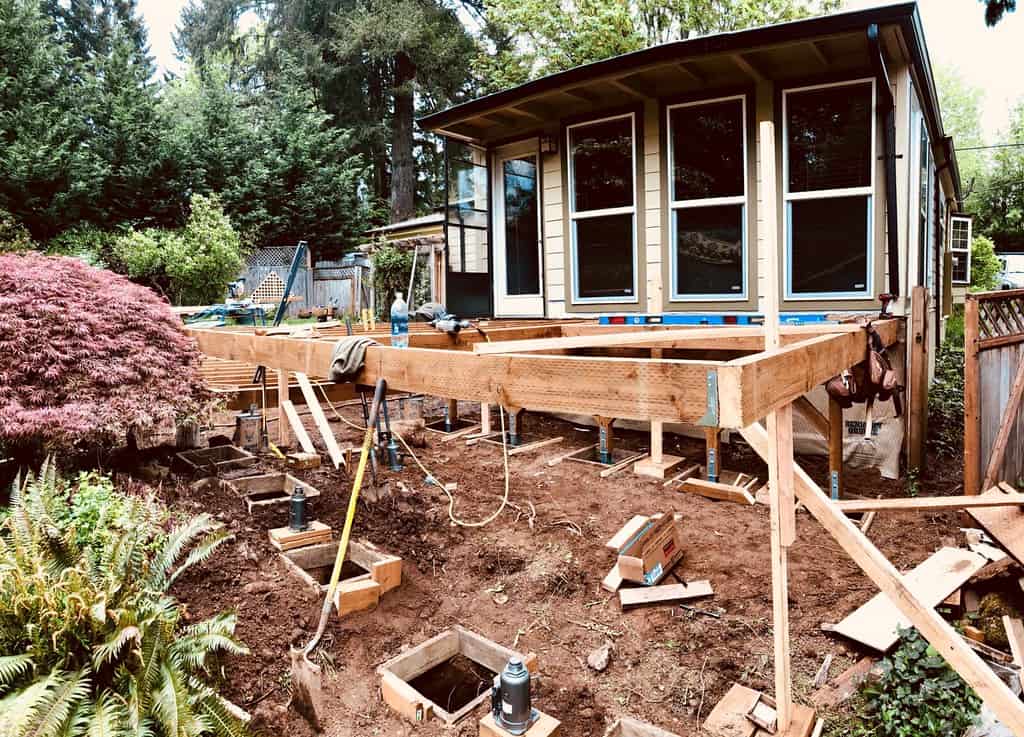
The cost hurts all the more because we’ve already poured nearly $100,000 into performing needed repairs on this property. (In fact, as you may remember, we considered forgoing the deck replacement altogether.)
Budgeting for this job led me to reflect on the costs of owning a home. Like my colleague J.L. Collins (who believes a house is a terrible investment), I refuse to join to the cult of of homeownership. Yes, I own a home — and have for 24 out of the past 25 years — but I’m under no illusion that this is a smart financial move. Kim and I want to own an acre of land in the country, which is why we bought this place. We didn’t buy it because we think it’ll make us wealthy. (It seems to be having the opposite effect!)
Today, both for entertainment and catharsis, I want to spend some time talking about the high costs of homeownership. And lest you believe the stories below simply prove that I’m a fool with money, I want to point out that my experiences seem typical. Everyone I talk to about homeownership has similar tales to tell. I’ll bet you do too!
Note: In an alternate reality — maybe my next life? — I’d be a competent carpenter and handyman, much like my pal Mr. Money Mustache. Pete has the skills and experience necessary to do most major home-improvement jobs himself. This saves him tons of money. I don’t have these skills. I’ve begun teaching myself how to make minor repairs, and I can even build some simple stuff out of wood. But I don’t know how to replace a roof. I don’t know how to hang siding. I don’t know how to build a carport. I don’t know how to build a deck and install a hot tub.
My First Lesson in the Cost of Homeownership
In June of 1993, when I was 24 years old, my ex-wife (Kris) and I bought our first home. It was a nice ranch-style house in my home-town. The seller had prepped it for market by keeping the lawn a gorgeous emerald green. It was well-trimmed and well-watered even until the day we moved in (June 23rd).
I’d grown up in the country, just outside of town, and our lawn had never been gorgeous. It was a rough patch of brown grass and — mostly — various weeds. I relished the opportunity to have a lush green lawn.
I did everything I could to maintain the green. I watered for an hour in the morning. I watered for an hour in the evening. Sometimes I watered for an hour in the afternoon. Throughout the month of July, I probably watered the lawn an average of twenty hours a week. (Seriously.) I mowed twice a week with a reel mower. I also applied a treatment of fertilizer. To weed the lawn, I got down on my hands and knees and crawled over every inch, pulling noxious plants by hand. No joke — I actually did this!
The days were long and very hot, but my lawn weathered it well. As July drew to a close, our lawn was, by far, the most spectacular lawn in the neighborhood. The most spectacular lawn in the city. For all I know, it was the most spectacular lawn in the state! It was a carpet of deep green, completely weed-free. I was a proud, proud man.
One weekend in early August, we attended a yard party at a friend’s house. The grown-ups sat around and talked about life, talked about gardening. The conversation turned, and people began to complain about their water bills. Water bills? Kris and I exchanged puzzled glances. Water bills? The conversation continued, and people began to compare water bills.
My heart began to sink. The implication was clear. I mustered the courage to ask, in a small voice, “Do you mean you have to pay for water?”
“Well,” said one woman. “Do you live in the city?” I nodded. “Do you have your own well?” I shook my head. I had grown up with a well, but didn’t have one now. “Then you’re on city water, and you have to pay for it.”
I broke into a cold sweat. “How much does water cost?” I asked. I’d always thought water was like air: a fundamental human right. Free! How could somebody charge for water?
Our first water bill came several days later. It was $80, which seemed like a lot to us at the time — especially since we had budgeted a grand total of zero for the expense.
I cut back my watering after that to just a couple of hours a week.
The Ongoing Cost of Owning a Home
Kris and I learned quickly about the costs of homeownership, as all new homeowners do.
Our first Christmas, for instance, we woke to find that the water heater had failed. Water had been spewing from the pressure-relief valve all night long, flooding the back end of the house. Instead of opening gifts, we spent our Christmas day cleaning up the mess and finding a place to buy a new water heater. Ho ho ho!
The next autumn, we had a wind storm. Kris and I were worried that one of the nearby cedar trees would topple into our house. Instead, the back fence blew over. We got a crash course in paying for and constructing a wooden fence. (We didn’t do a good job of repairing things. Before we moved out of the house in 2004, we had to repair the fence once more.)
Fortunately, these sorts of minor catastrophes were few and far between. Our home was relatively new — built in 1976 — so systems seldom failed. When we spent on the place, it was generally elective stuff: putting in Pergo, painting the walls, building raised garden beds.
In June 2004, after eleven years in our little ranch house, Kris and I bought a bigger place close to Portland. This hundred-year-old farm house stood on two-thirds of an acre of land. Unlike our first home, our second home required a lot of ongoing maintenance. The roof leaked. The wiring was downright dangerous. (The electrician we hired was alarmed at the state of the wiring. He documented it to share in an online electricians forum where his colleagues exchanged horror stories.) Tall trees were diseased and rotten.
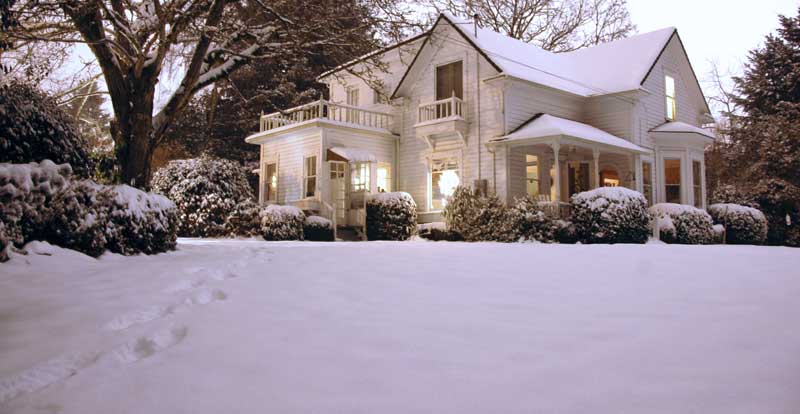
As long-time Get Rich Slowly readers know, this hundred-year-old farmhouse turned out to be more work than I anticipated. Initially, I believed it was my dream house. I was wrong.
Because our old house had seemed like such a burden, after our divorce I deliberately looked for a place with zero maintenance. I bought a penthouse condo along the Willamette River. (By the way, Kris still lives in the hundred-year-old farmhouse, and she loves it.)
While it’s true that the condo had no outdoor maintenance (that was handled by the home-owners association), things still broke inside the unit. The dishwasher died. The A/C had a chronic coolant leak. Somehow, the bathtub began to drip water into the unit below. The gas fireplace stopped working. The cats tore up the window blinds. And so on.
When you own a home, there will always be repairs — large and small — waiting for your time and money. It’s not a matter of “if”. It’s a matter of how many and how much.
Note:You’ve probably heard the common recommendation that you should budget one percent of your home’s value for annual repairs. (So, for instance, if your house is worth $400,000, you should budget $4000 per year for maintenance.) I like this rule of thumb, but I think it’s a bit misleading. From my experience, the cost of home repairs tends to be “clumpy” rather than smooth. It’s not like you predictably spend $325 per month on maintenance. Not at all! It’s much more common to have a $12,000 repair one year — then spend almost zero for three or four years before the next major thing comes along.
Mo’ Money, Mo’ Problems
Last July, my girlfriend Kim and I moved to our current location, a small home in a quiet area on the outskirts of Portland. We love the house, we love the lot, and we love the neighborhood. The downside? This place has been a money pit.
When we bought our new home, we knew it needed work. The pre-purchase inspection revealed plenty of problems, from a failing roof to rotten siding to crumbling decks. It was even possible that the foundation was falling apart!
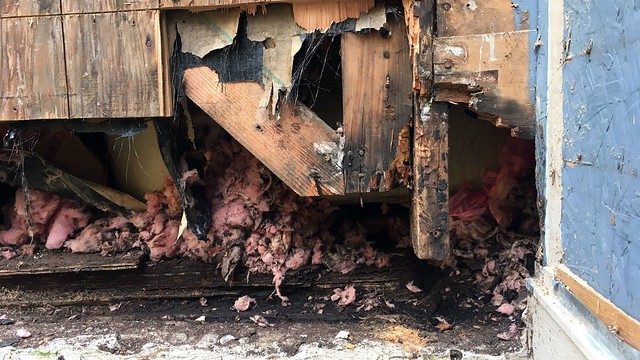
Before buying, Kim and I talked at length about whether we wanted to take on this sort of project. For five years, we’d lived in that cozy condo, which had been relatively trouble-free. Plus, I had been notoriously averse to home improvement (and yard maintenance) in the past. Did we really want to trade our worry-free life for a long list of headaches? Ultimately, we decided that we did.
I crunched the numbers. “If the condo sells for as much as I think it will, we should have $40,000 or $50,000 to make repairs,” I said. “That should be enough to cover everything — unless the foundation is shot.”
The condo sold for more than I expected, which meant that we moved to our new old house with a $59,000 “profit” that could be funneled directly into our remodeling projects. We started right away.
The Money Pit
I’m not sure how things are in other parts of the country, but here in Portland contractors are booked solid for weeks — or months. Because of this, they’re able to charge much higher rates than I’m accustomed to paying. (Higher demand means higher prices, just like you learned in high school economics class.)
Over the ten months we’ve lived here, Kim and I have managed to find folks to make all of the necessary repairs. But it’s been costly. We’ve paid for the following projects:
- HVAC System. We completely replaced the previous HVAC system, installing an ultra-high efficiency furnace and air conditioner. (In retrospect, the A/C was probably the dumbest home improvement decision I’ve ever made. It seemed like a good idea at the time, though.) Total cost: $15,069.
- Gas line. The folks who bought our condo didn’t want the gas range, so they simply gave it to us. Great! Except that we didn’t have a gas line running to the new kitchen. We paid a handyman to install everything. Total cost: $1,000 and a lot of cursing.
- Floors. When we moved in, the floors were shot in every room but two. There was extensive water damage (and rot) in the bathroom and one bedroom. The carpets in three rooms were caked with mold, mildew, and animal urine. (Our entire neighborhood is infested with mice.) It stunk so bad that some days it gave me a headache. We hired a company to replace the carpets, install oak floors in the kitchen, and refinish the wood floors throughout the house. Total cost: $9,585 and mild cursing.
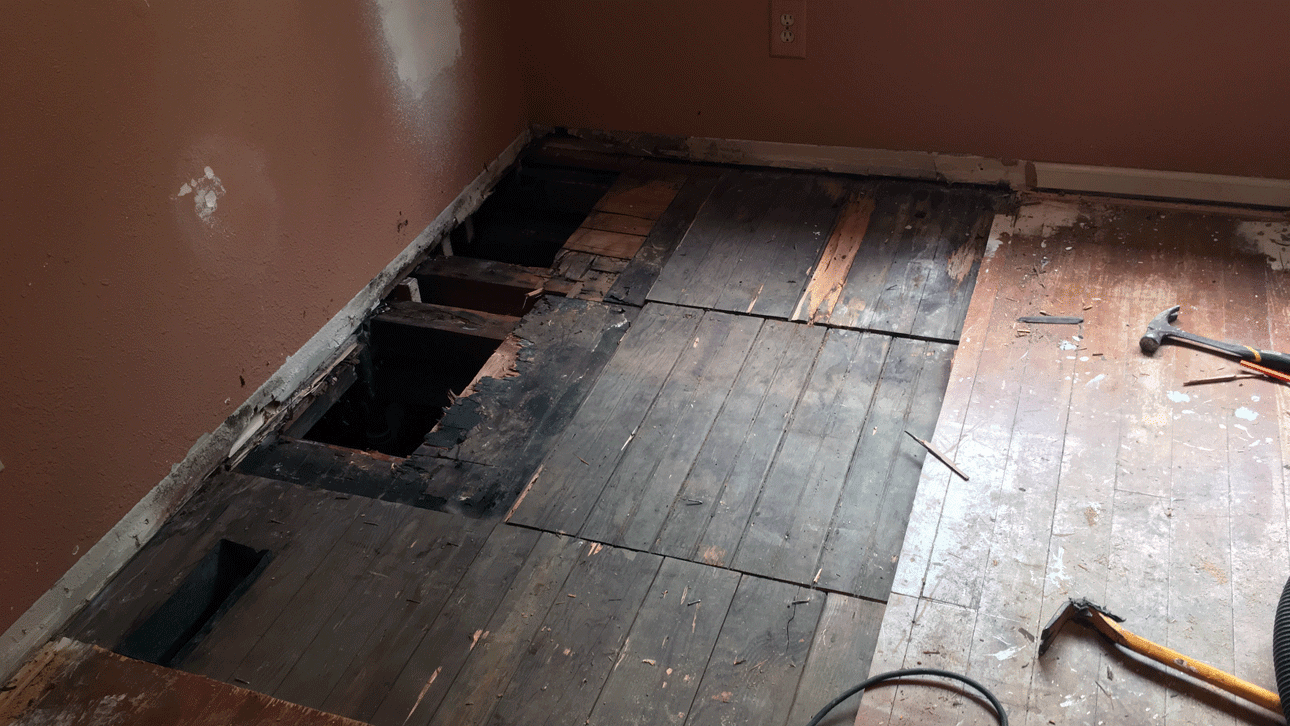
- House envelope. Our biggest expense came from having to replace the entire envelope surrounding the home. We paid one company to do all of this work. While replacing the roof, they found extensive rot in one area and had to replace the plywood. While removing the old siding, they found many areas of rot, including a large section behind the bathroom where termites had invaded. This led to an unplanned bathroom remodel (see below) plus some re-framing. Last of all, they replaced the front deck, which had begun to collapse. Total cost: $36,680.56.
- Gutters. While replacing the envelope, our contractor paid another company to install new gutters and downspouts. Total cost: $1,300.
- Bathroom. As I mentioned above, we had to tear up half of the bathroom (and part of one bedroom) in order to remove rotted material that was drawing insects to the house. This project was a colossal headache to everyone involved — but it looks great now! Total cost: $4,300.05, many late nights, and tons of cursing.
- Carport. Over the winter, we discovered that the carport erected by the previous owner was poorly designed. Its huge surface area drained onto the roof of the house, overwhelming gutter capacity. Water would both spill behind the siding into our bedroom and pool at the bottom of our sloped driveway, at the base of the house. We considered demolishing the carport and living without it, but in the end paid a contractor to build us a new one. It was expensive. Total cost: roughly $25,000.
All told, we’ve spent $92,934.61 on remodeling since July 1st. That’s roughly 60% above our $59,000 budget. I guess things could be worse — we might have had to replace the foundation! — but the expense is still painful. Very painful.
When we bought this place, we knew there’d be work. But, as I said, we didn’t know there’d be this much work. I’ll be honest: At times, both Kim and I have felt like giving up. When we think about how much time and money we’ve spent, our hearts sink.
“Do you regret having bought the house?” a friend asked me during my recent road trip across the southeastern U.S.
“You know what? I don’t regret buying it,” I said. “I do regret not having asked for more concessions from the seller. I regret not understanding that a bad inspection report probably meant there were more things wrong with the house than were visible. I regret that our total cost for the place is going to end up closer to $600,000 than $450,000. But I don’t regret buying the home. Kim and I love it!”
Kim and I really do love this house. For where we are in life, it’s perfect. I suspect we’ll live here for a long, long time. That helps ease the sting of remodeling costs a little — but only a little.
“You should watch The Money Pit,” a friend told me recently after hearing about our trials and tribulations. I scowled at her. “No, I’m serious,” she said. “It’s hilarious. Plus, you’ll totally be able to relate to it now. It might actually feel better about your situation.” So, Kim and I watched The Money Pit. It wan’t hilarious — but maybe that’s because it hit too close to home.
No Longer a Shack
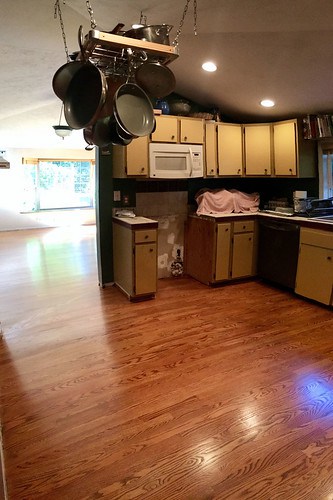
“You know, I considered buying your house,” one neighbor told me last week. “Before the previous owners put it on the market, I took a look. I decided to pass, obviously. I felt like it was a tear-down. But I’ll give you guys credit. You’ve made a go of it. The changes you’re making look great, although I’m sure they’re expensive.”
This neighbor’s evaluation of the property is echoed by other folks we talk to. “That place is a shack,” one lady told me soon after we moved in. “I’ve been in the house many times. It needs a lot of work.” She’s right. This house did need a lot of work, but I’m pleased to report that it’s no longer a shack.
Now that the hard stuff is over, there are lots of little things left to do — new paint in every room, prepping the guest bedroom, minor repairs all over the place — but the major projects are complete. We’re ready to relax and enjoy the space.
Personally, I’m ready for the bleeding to stop.
One of the primary reasons I wanted to move from the condo was to reduce our average monthly housing expense. Between taxes, insurance, and HOA fees, we were paying more than $1200 per month to live in a place that we ostensibly owned free and clear. It drove me nuts! My calculations showed that the monthly costs for the “country cottage” ought to be less than half that. And they have been.
But that savings of $600 per month is more than outweighed by the huge repair costs we’ve incurred. It’ll take ten to fifteen years to make up the difference, to break even with the condo expenses. Maybe in 2033, I’ll throw a little party to celebrate how smart I was for buying this home…
What about you? What has your experience with homeownership been like? Is it less expensive than renting? More expensive? All things equal, would you prefer to own or to rent? Share your stories of unexpected home expenses — and how you’ve coped with them.
Become A Money Boss And Join 15,000 Others
Subscribe to the GRS Insider (FREE) and we’ll give you a copy of the Money Boss Manifesto (also FREE)

There are 1 comment to "The high cost of homeownership".
Now imagine this through the lenses of the 2020-2022 inflation. Mind-numbing.